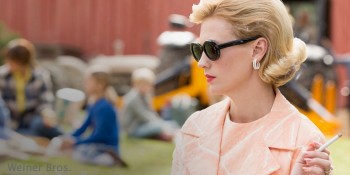Gentlemen, I’ve been lying in wait for something to spark my analytic powers. As I watched “Field Trip,” the minutes flew by and I was rapt by the unfolding drama, but I was confounded by its duality. Why link Don and Betty now? And what really linked the stories in this episode, besides each character taking a titular field trip (or two, in the case of Don going to California and the equally foreign offices of SC&P)?
In my listless drifting in the days since the episode aired, I must admit I’ve taken a peek at some of our peers’ reviews of this episode (you know: GQ, Rolling Stone, The New York Times — the other outlets on our level). Doing so reminded me that either we were all right in high school when we thought our teachers were imparting unintended motives and themes onto long-dead authors’ works, or Mad Men is the genius of a modern-day Shakespeare, Poe, or Steinbeck, playing out right before our eyes.
I’ve been right there with many of the ideas picked up on by the wider critical viewing audience in the first two episodes of the year, but I felt far out of step this week. While I couldn’t latch onto a single solid theme, other’s found countless angles to analyze here: Megan’s confident handling of Don contrasted with her desperation in show business; Peggy’s lingering grudge toward Don, the roots of which have all but receded into nothingness; Joan’s shifting allegiance to Jim from Don; Harry’s scorched-earth approach; Roger’s ever-erratic behavior forcing his partners’ hands once again; Don’s admission to Megan that he didn’t want her to see him in a certain negative light.
It became evident to me that there was so much going on in this episode that my true struggle was figuring out where to put my focus. Even the smallest details have been called out as literary devices: Bobby trades away Betty’s sandwich while, back in Manhattan, Don eats a chicken salad on rye. I feel paralyzed by the sheer volume of significance in each action, camera shot, word, or gaze.
As I said earlier, nothing confounded me more than the continued saga of Betty Hofstadt Draper Francis. She seems an afterthought to the main narrative at this point. I came around to the view that she is being used as the backdrop to illuminate the personalities of the Draper children, to showcase their reflection of their father’s traits and the psychological damage he has inflicted on them. After all, that seemed to be the trajectory of Sally’s story last week. But Bobby has had less opportunity to be disappointed by his father. Instead, it’s Betty’s imperialism that continues to reign over the poor boy. I don’t see this week’s edition as Bobby-as-Don, but as yet another exploration of Betty.
I’ve come to believe the writers feel they owe Betty’s character some closure. I feel the show could have packed her away with the divorce, giving us the occasional cameo when Don had to pick up the kids. Instead, we got Fat Betty, and fish-out-of-water-in-the-Village Betty, and now Betty on the Farm. Her maternal abilities were called out this week, and she responded by chaperoning a field trip — a chance at character development that would edge us toward that closure the writers may be seeking. Instead, Betty showed herself again to be unable to perceive the love being thrown at her by Bobby. Instead, Betty showed herself again to be more concerned with being perceived as a good mother than with being one.
Coming out of this episode, I can clearly see the progressive strides Don has made over the course of a decade. It seems that those around him are either trapped in their unhappiness, like Betty, or veering off the tracks, like Roger, Peggy, and Megan. I fear for the health of the people around Don, not the man himself. I also fear for myself as I try to keep up with the brilliance and the layers of meaning packed into each hour of this program each Sunday night.
